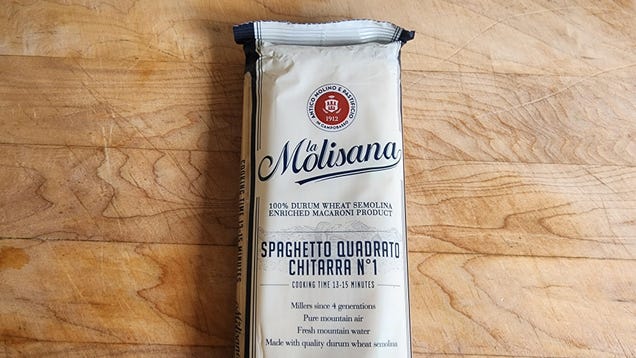When it comes to dried pasta, I normally pick up what I see at the grocery store, and that’s De Cecco. This pasta is tried and true; it’s the brand we always used at the red sauce joints I worked for, and I’ve always considered it a step up from Barilla, Anna, and the like. De Cecco is a well-made product with an awesome variety of pasta shapes that’ll do the job whether you’re going for an Italian-American spaghetti and meatballs or a bucatini all’Amatriciana. I’ll never fully leave De Cecco behind, but I have discovered a new dried pasta that usurps it: La Molisana.
What is La Molisana pasta?
La Molisana is an Italian food company founded in 1912, based in Campobasso, a city in Southern Italy surrounded by mountains. (Campobasso is the capital of the Molise region.) Most pasta brands do their past to sell their products by painting the picture of an authentic process full of rich family history and cultural influence, and La Molisana is no different.
“Imagine a pasta factory on a mountain in the heart of Molise,” the website copy waxes. The factory is indeed one of the highest in Italy, at about 730 meters in the air.
These pasta brands really try to sell you on quality by selling you on the vibe. Just about all of them tout that they have some unique, eco-friendly attribute—mountain spring water, a special process for milling semolina flour, etc. But then you taste it and go, “It’s just pasta, bro.”
G/O Media may get a commission
La Molisana is different, however. The pasta factory in the sky makes a strikingly good product. Specifically, I’m looking at the Spaghetti Quadrato Chitarra No. 1.

Why Spaghetti Quadrato Chitarra No. 1 is so good
The texture of this dried pasta is unlike that of most pastas at the grocery store. This package bursts open with a puff of flour like LeBron’s iconic pregame ritual. The spaghetti isn’t smooth and circular, either. This pasta is jagged, tubular, square cut at the ends. Run your fingers along the strands of spaghetti and you’ll notice an unbelievable coarseness. While a lot of La Molisana’s pasta is bronze cut, this product actually claims to be cut on a chitarra.
The chitarra (which means “guitar” in Italian) is a stringed contraption that cuts the pasta in thin square strips. Chitarra-cut pasta is still tubular like spaghetti, but has this sort of micro-jagged edge that’s even better for picking up sauce. There’s a great Pasta Grannies episode where you can watch a woman from Petoro press dough through the stringed chitarra, forming a pasta she eventually serves with a lamb sugo.
A pasta maker in Los Angeles whom I love, Christian Stagliano of Los Boludos, uses the chitarra for many of his dishes. He says this makes the pasta “way more coarse, and gives it more bite to the pasta itself.”
“[It] also helps soak up sauce and adheres [it] to the noodle more,” he added.
The chitarra is a rather intimate tool, however, and can only make so much pasta at once. I have to think that the chitarra process at La Molisana is a bit more industrialized.
“I’ve been seeing a lot of people use a chitarra extruder,” Stagliano told me via text, along with a frowning face emoji.
However La Molisana achieves its chitarra-cut pasta, it’s still quite wonderful and somehow feels personal, down to the poof of flour out of the package itself.

I paired the pasta with a quick arrabiata red sauce for lunch this week. The most impressive thing here is the bite, noticeably chewier than other name-brand pastas. It feels like you’re eating more pasta with each individual strand of spaghetti. As I pick up a single noodle during the cooking process, it feels heavier. The sauce clings to the pasta pretty much instantly, and I don’t notice any of that slipperiness you get from the cheap stuff. La Molisana has the strength to hold up to any red sauce but is versatile enough to stretch into just about every sphere of Italian cooking. It’s my new favorite dried pasta.
I bought a six-pack of Spaghetti Quadrato Chitarra on Amazon for $40, but also, get this: Sometimes you can find it at Big Lots. I haven’t seen La Molisana at any grocery stores or Italian grocers within my area, but the fact that it can be seen at Big Lots (for a dollar!) only adds to Big Lots’ bizarre lore. There are tons of bougie pasta brands out there being sold for nearly ten bucks a package, and most of it tastes damn near the same. La Molisana, even though it’s factory made, feels intimate and authentic. Just like Big Lots.

IL PRIMO ECOMMERCE SPECIALIZZATO IN DELIZIE AL TARTUFO E CAVIALE – CAVIAREAT.COM
